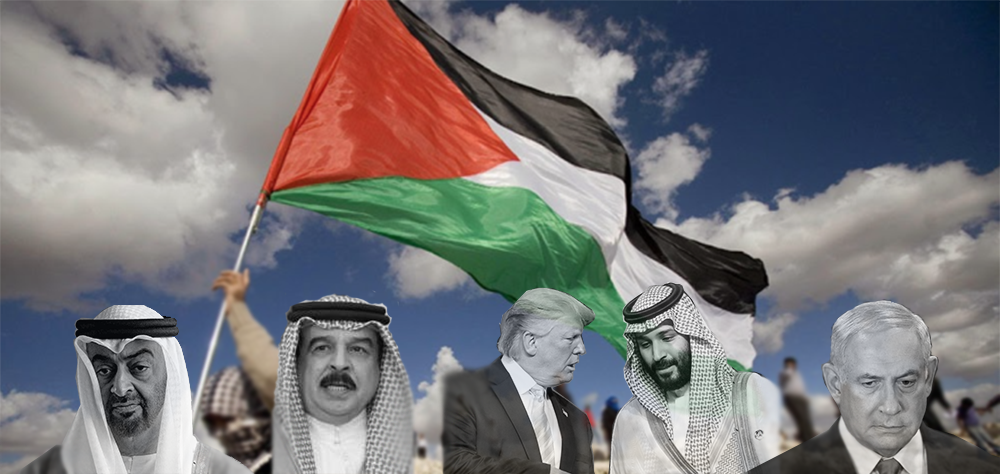Alwaght- The normalization of relations of the UAE and Bahrain with the Israeli regime is considered as causing a stain on the contemporary political history of the Arab world and has sparked a significant wave of dissent. Among these, the most important opposition belongs to the Palestinian groups that promptly condemn the normalization of relations between the Arab countries and Israel and have referred to it as a betrayal to the Palestinian cause. Also, the Palestinian National Authority passed a resolution to the Arab League condemning the United Arab Emirates (UAE), which was rejected by the members.
Following the Palestinians' strong opposition to UAE and Bahrain's agreement with the Israeli regime, it now appears that the Arab States led by Saudi Arabia (who have been organizing the whole normalization process under its command) are pursuing a number of tempting economic and political proposals to the Palestinians in order to keep them satisfied and to be able to move forward with the normalization of relations with Tel Aviv. Arab states now claim that their agreement with the Israeli regime and normalization of relations are in the interests of the Palestinians. The UAE has even claimed that their agreement has halted Netanyahu's annexation of the West Bank. The question arises that, what are the economic plans and the claim of the Arab countries in pursuit of the interests and rights of the Palestinians, and to what extent are they able to seduce the Palestinians?
Extortion of Palestinians Over the so-called “Deal of the Century”
Following the normalization of relations of Bahrain and the UAE with the Israeli regime, over the past few days’ news sources have reported that the governments of the UAE, Saudi Arabia, Bahrain and Egypt have seductively proposed to the Palestinian Authority to not oppose the compromise that has been done in recent months. Evidence suggests that the new plan promises the Palestinian National Authority that it will suspend the annexation of the West Bank to the occupied territories and begin negotiations with Israel in exchange for not opposing to the process of normalization of relations with Tel Aviv. The UAE and Saudi Arabia have also proposed major economic projects to Ramallah officials, including massive investment in infrastructure and the opening of direct trade channels and also the sale of oil and gas at low prices to the Palestinians. Riyadh and Abu Dhabi also proposed to the Palestinians that they would build large industrial estates and employ tens of thousands of Palestinian engineers and academics in companies located in Arab countries neighboring the Persian Gulf.
This seductive offer made by the Saudi and UAE regimes to the Palestinians came in the wake of a far greater economic offer made to the Palestinians in June 2019, when Bahrain hosted the "Peace to Prosperity" workshop run by Donald Trump's son-in-law Jared Kushner, which was categorically rejected by the Palestinians. In that plan, Kushner proposes to the Palestinians that $50 billion will be handed over to them within 10 years, relying on three levers of "people, economy and government" in exchange for relinquishing sovereignty over Al-Quds and accepting the so called “deal of the century”. Also as part of the new plan was to build a new link (highway or railroad) between the West Bank and the Gaza Strip that would cost $ 5 billion.
Therefore, it is clear that the recent proposals are in fact the same economic advantages as the White House proposed to the Palestinians, except that firstly, the economic proposals are less valuable than the promises of the “deal of the century”, and secondly that these governments will certainly not be able to deliver, due to the economic crises caused by the fall in oil price. Following the coronavirus outbreak, Bahrain, the UAE and Saudi Arabia are among the countries that have resorted to borrowing or issuing bonds for financial matters.
In April 2020, Abu Dhabi borrowed a total of $7 billion in government bonds via three different maturities to compensate for the liquidity crisis caused by the falling of oil prices, according to The Gulf Online database. The situation is even worse for the Saudis, in recent months Riyadh has withdrew the money it put into a joint venture with Pakistan.
On the other hand, this indicates the ridiculousness of their claim to support Palestine and such an act can only be assumed as a purpose to achieve their goal of normalization. Undoubtedly, the United States and the Israelis will pursue other dangerous clauses of the “deal of the century”, including the complete occupation of al-Quds, the international recognition of illegal Israeli settlements in the West Bank, and dismissing several million Palestinian refugee cases in neighboring countries.
The Arabs and the Execution of the American Will
Arab countries have been secretly cooperating with the Israeli regime in the past years, especially after the Oslo Accords in 1993. However, during this period, it is noteworthy to mention that they have not been able to prevent Tel Aviv from occupying Palestinian-controlled areas and stop the formation of new settlements and military strikes applied to the Palestinians. Yet, it is not clear how the Arab countries intend to defend the rights of the Palestinians by making a few economic promises, while their relations with the Israeli regime have been revealed. The fact is that Saudi Arabia, Bahrain, the UAE and some other Arab countries have officially become Donald Trump's puppets, only to become beneficial to Donald Trump and help him win the November 3, 2020 General Election. At this point, these countries, without any will, have become a complete servitor to Trump and are trying to help him claim victory over Joe Biden by advancing the process of normalizing relations with the Israeli regime. In the meantime, Trump desperately needs this project to be a success in order to unveil it as his great foreign policy achievement.



























